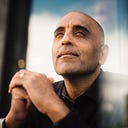Didn’t Learn a New Skill in Quarantine? Here’s Why…
If you’ve been inside for over a year and haven’t mastered cross-stitching, baking sourdough bread, organizing your pantry, learning a language, or doing the splits, you may have had this thought…
“I guess it was never not having the TIME after all…It was just me, lacking discipline.”
You’re not to blame — that same sentiment was all over the internet for the last year.
In a world that reviles free time and instead pressures its people to “use that time wisely,” this philosophy comes as no surprise.
The problem is twofold:
- What is a “wise” use of your time? Says who?
- Why are we always begging for peace and quiet, only to feel guilty about indulging in it?
Historically, those in charge have decided that the “wisest” use of your time is the most “valuable,” in that it provides society with the most value.
We beat ourselves up for not “learning new skills” during that time because we either didn’t have the time in our regular, hectic, never-home-always-running lives to do that, or because learning a new skill would have catapulted us further up the food chain and helped us find better paying, more fulfilling work.
But perhaps more importantly… Why were we rejecting the peace we asked for once we got it?
Psychologists have a theory about that…
The Coronavirus Pandemic Struck Grief
But not the way that you think.
Yes, we as a society have grieved the loss of human life.
But we also grieved our normal.
Our spring, summer, fall, and winter…
Our visits with family and friends, our time spent running errands and traveling our limited local expanse, our dance classes, our livelihoods (for millions of us), our graduations, our support group meetings, our brief respites at the corner table in the coffee shop with the view of Main Street out of the window, our stocked grocery stores and our ease in touching the people in our lives, our joy in making travel plans, our sweet and secure knowledge that (however mundane) tomorrow will probably have a lot in common with today.
We were grieving life as we knew it.
And the more the media spins itself in circles trying to push their agendas and the more we ignore our personal grief, the more paralyzed we’re going to feel.
When you experience a loss in your life — a tangible, societally-sanctioned loss — we’re told to give ourselves a break.
But for the last year, while a plague ravaged the world and no one knew when they’d be able to roam freely again, we knocked ourselves for not “using that time” to learn how to code.
Our Monkey Brain
There were many things that could be happening to each of us in our bodies, then and now. But for the most part, they can be broken down into two categories.
Either…
We feel constantly anxious, paralyzed, and ill at ease…
Or…
We feel shockingly numb and calm in the face of large-scale chaos.
If you’re feeling like your shoulders never leave your earlobes… That’s your parasympathetic nervous system staying in overdrive. You know, your fight or flight system.
You see, because of time compression, stressors layer within us until they become collectively too heavy, and it’s like we’re depressing our nervous-system-engage button permanently.
That means we’re not thinking with our prefrontal cortex — we’re thinking with our primal, frightened, monkey brain.
There are ways to combat that… but we need the energy and clarity to do it.
Alternately, some of us feel like we zoned out through this entire thing. Not paying attention to the news, not hinging on each and every update, not actively desperate for life to return.
Sometimes, those who suffer from PTSD, or those who lived accustomed to drama and mess, find peace in the eye of the storm.
That is a trauma response. And make no mistake, a global lockdown and a sweeping pandemic is trauma.
When you can’t control your surroundings, some people develop a coping mechanism to help them stay calm during turmoil. So if you feel like none of this really hit you…
That might be what’s happening.
But the last thing that will help you is increasing the allostatic load of stressors by blaming yourself for not rising above the sea of trauma we’re all swimming in.
The best thing to do? Practice kindness towards yourself.
If you enjoyed these thoughts and think we’ve got something in common, I have a feeling you’re going to love the streaming service I launched last year — whole.tv. It’s my answer to the dilemma of conscious consumption, where you’ll find ALL of my documentaries and series, as well as more from renowned thought leaders like Nick Polizzi, Dr. David Perlmutter, Dr. Tom O’Bryan, and more. Try it for two weeks — on me.
